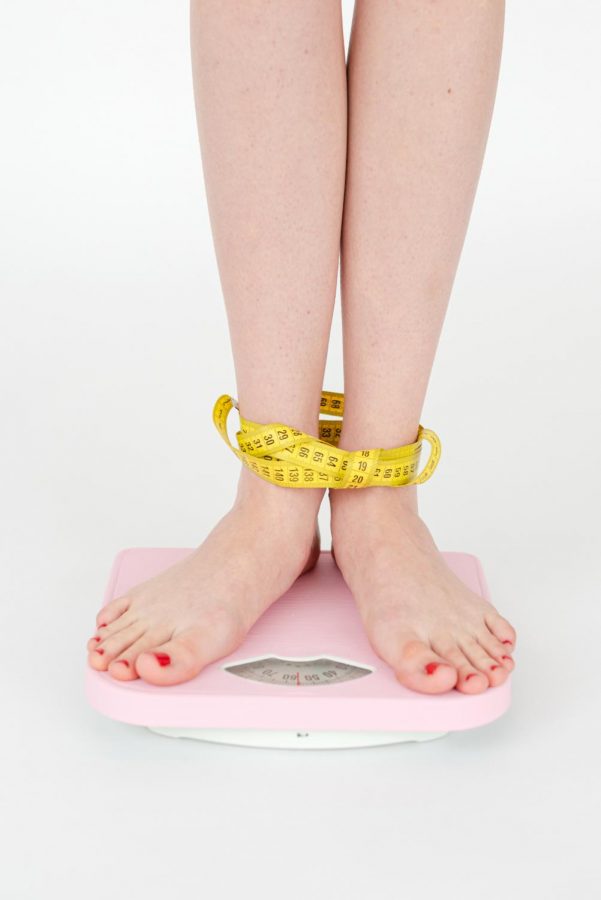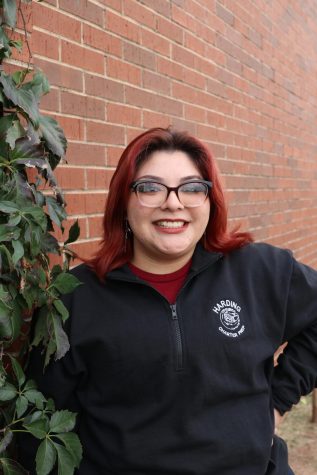My body shouldn’t scare you
Fat people have often been the butt of a joke in film and in the media, but they are fighting back with the message that representation matters and that being fat isn’t something that should be feared.
November 5, 2021
Growing up fat was never easy. It was hard to not compare myself to all the skinny little girls at my elementary. Sometimes I wouldn’t even finish my lunch so it wouldn’t look like I was eating too much. Getting bullied didn’t help either.
At my elementary school we had to wear uniforms and from a young age I’ve hated how uniform pants look on me. I would even wear a jacket to cover up my so called ‘fat.’
It never helped either that when I would turn on the TV and see all these actors with small thighs and even smaller waist. There would even be times I wouldn’t wear a certain outfit because I hated how ‘fat’ it made me look.
I started exercising and trying out weird diets by the age of 10, thinking that I would be able to lose the weight instantly, since that was what the internet and my doctor had told me. I would never see results and got so frustrated with my body, so I would try eating less, only that never worked since my Mexican mother was always cooking delicious meals.
P.E. in elementary and middle school was never easy since I only ever saw the number on the scale go up, and it wouldn’t help when kids would brag about their weight and talk about it like it’s some sort of prize.
It hurt me that to think that I would never lose the weight and would stay “fat” forever.
Going to the doctor became something I feared and I would tell my mother how I didn’t want to go every time it was time for the yearly checkup. I was tired of hearing the same thing. I was tired of being told to lose weight.
There was one time where my doctor recommended I lose 20 pounds and I got so frustrated with her that I told her to chop off my leg and she’d have her 20 pounds.
My mom was even blamed for having an obese kid — she was told she was a bad mother for letting me get so fat.
It was like the world never wanted me to be happy.
By seventh grade my body was something that was always on my mind and I would exercise excessively on the daily and basically starve myself by only eating a poor salad for lunch.
I had never thought that having such a low self-esteem would be something that would trigger my depression.
It wasn’t/isn’t always easy being one the bigger girls in my class, not to mention the fear of never finding love. I thought that no one would love me or want to date me for my weight.
The internet is never helpful either, as these girls my age would get famous on Instagram just for being skinny and pretty. I wanted to look like them so bad.
But this is just my story. Many women go through similar and even worse situations. It’s important to focus on body positivity rather than a number on a scale. Size does not equal health.
Beauty standards have changed over the years but being skinny is something that has been popular for quite some time. From fad diets to cheap waist trainers, some women will do everything and anything to get skinny.
Terese Atkinson, a graduate of the University of Minnesota — Twin Cities, double majored in Studies in Cinema and Media Culture and Communication Studies and graduated in 2020.
“The entirety of my senior year was very focused on how bodies were portrayed in media,” Atkinson said. “My senior project was a video titled ‘Fat Female Bodies in Film, a Conversation’ where I interviewed some of my fat female friends about how the representation of fat/bigger-bodied women in film made them feel.”
She said that it is hurtful when people fear being a certain size.
“As someone who has been fat their entire life, it’s frustrating and heartbreaking that so many people are afraid of being fat,” Atkinson said. “It hurts more than anything else that someone’s worst fear in life is to simply look like me and to have my body type. It’s also frustrating that people refuse to admit this fear and refuse to reflect on why they hate the idea of being fat and the idea of fatness.”
Monica Rubio, who is working toward a bachelor’s degree in psychology, works with high school students every day in her career, helping them with their academics at a local high school in Massachusetts, said fat people just want to be accepted.
“I think this is a systematic issue that has roots in all the ‘isms’ that affect us now today,” Rubio said. “People fear being fat because they know they will be discriminated against and limited in many ways career and health-wise. We know desirability politics affect us all at our core because the systems of oppression are designed to do that. Nobody wants to be less desirable than others, yet here we are, wanting to be accepted by society’s standards and participating in harming not only ourselves but potentially others in the process.”
Another thing that doesn’t help is the practice of skinny privilege. Skinny privilege happens whether people want to acknowledge it or not. It is true that society will treat you different if you are skinny. Not to mention that buying clothes will always be easier for skinny women.
“When I lost a large amount of weight, I noticed that a lot more people were being nice to me and more people would notice me,” said April Zapata, who lost a significant amount of weight from 2017 to 2018.
“There was also a big number of people who I didn’t talk to but I knew would give me compliments about my weight loss. The other thing I didn’t expect was even when I dressed down, men would still somehow like me and would actually take their time to talk to me. It made me feel weird because I wasn’t used to getting compliments about myself. I would just awkwardly say thank you to the compliments,” she said.
For many years women have tried dangerous things to lose weight and have even suffered mental illnesses from it.
“One of the most harmful things I have done to myself is having an eating disorder,” Rubio said.
“The most dangerous thing I have done to try to lose weight wasn’t fully intentional. My sophomore year of college I couldn’t afford food, which caused me to lose a significant amount of weight over nine months,” Atkinson said. “When I moved back home for summer, numerous people complimented me on my weight loss and started treating me better. To maintain this type of attention, I would go through phases of starving and binge eating, which was detrimental for both my physical wellbeing and mental health.”
Companies like to think that no one in the world is fat and will make their clothes up to size 16 and stop, sometimes even smaller. But when there are clothes for plus size women it usually ugly and never stylish like the clothes that are made for smaller people. Plus size women like to wear shorts and crop tops too!
Supporting shows like “Insatiable” doesn’t help either. The show is about a girl who was fat and bullied and then got hot and now is seeking revenge for everyone who was mean to her. It includes fat suits and body shaming and sends the idea that slim is best.
Although star Debby Ryan did tweet “We’re not in the business of fat shaming,” she wrote. “We’re out to turn a sharp eye on broken, harmful systems that equate thinness with worth.”
Many people were hurt by the show and did not have a positive response to it getting another season. Many people were angry with Netflix and would spam Netflix’s comments about how horrible the show was.
Another example is the anime “Kiss Him Not Me” which is about a girl who is fat and then suddenly loses a bunch of weight by staying in her room for one whole week without eating. She goes back to school and suddenly the four most popular guys at school have a crush on her. In the show she even gains all the weight back and is forced to lose it again by some of the guys.
Not only did this anime promote an eating disorder, but also the fact that you have to be skinny for a guy to like you.
Body positivity has become a huge thing and many people have been becoming more confident than ever, no matter the size they are. The internet has been changing and being plus size shouldn’t be scary anymore. There will always be haters and ignorant people who will try to bring someone down.
However, in Atkinson’s opinion they said that body positivity is both good and bad.
“[Body Positivity] started out as a movement to provide a space for black/brown, fat, queer and disabled bodies. A space for these minorities to be treated as human, to see their bodies represented, and to start a journey to accepting their bodies when society told them not to. It has evolved into something that is commodified, it has been almost overrun with white, cis, abled body, and straight-sized people. It has devolved from a movement to bring up those most marginalized to a movement for people with any insecurity to feel good about themselves, even if they fit the ‘beauty standard.'”


